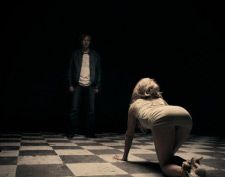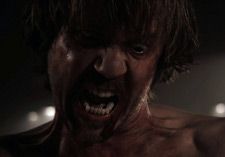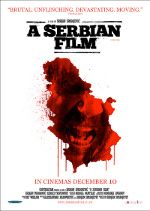
A Serbian Film arrives on a wave of controversy
Here's an irony. When Eye For Film rang the Belgrade offices of Contrafilm to speak to Srdjan Spasojevic, we were put temporarily on hold – and what muzak should be playing down the line than a cover version of The Entertainer?
Certainly there are few conventional entertainments to be found in Spasojevic's feature debut A Serbian Film (Srpski Film), which is a censor-bothering torture show that rapes the eye with its horrific blend of sex, violence and minors. Its director, co-writer and producer, however, far from being some drooling embodiment of depravity, is the height of charm, and speaks about his film with the sort of conviction and passion that would be necessary to see anyone through such a difficult production (not to mention post-production).
In his opening words Spasojevic asks for a few seconds to light his cigarette, adding with a dry laugh, "It is permitted to smoke during a phone interview." It will not be the first time that he will present himself as a defiant opponent of political correctness, as he talks at length on the subject of being silenced.
Your film is set in a stylised world of pornography. What do you regard as the role of pornography in your film? And – although I realise this is a ridiculous question - do you regard your own film as in any way pornographic itself?
Absolutely not. I don't regard it as pornographic. First of all, a crazy thing, there are no pornographic shots in the film. No penetration or no explicit pornographic shots. On the other hand, this was one of the major metaphorical takes in the film - to treat pornography as real life - because in the last few decades of political nightmare in this region, and several wars, we've brought ourselves to the point where we consider our lives as pure exploitation. In order to lead a normal life you have to become a prostitute, and sell your soul – and your ass – to the highest bidder in the name of feeding your family, and be viciously exploited by your boss and by rulers of your destiny. So, the pornographic issue and the sense of pornography in this film is just used like our everyday life. Any kind of job you can get, you can be viciously exploited.
Within your film, the 'art-porn' director Vukmir (Sergej Trifunovic) tells Milos of his ambition to create a kind of Serbian cinema that, in all its grotesque perversion and visceral rage, will be devoured by international audiences desperate for vicarious sensation. Was this also something like your ambition? What motivated you to make this film, and did you aim it primarily at the domestic Serbian market or at foreign viewers?
Lots of questions in one. We'll try to find some order. First of all, the initial idea was to make a film that incorporated our desire to express our honest and strongest personal feelings and personal sentiments about this region and the last few decades of war and political and moral nightmare, in combination with the world in general – today's world is, let's say, sugar-coated in political correctness, but actually very dirty under that façade. That was the initial idea, and to try to speak honestly about the problems that are all around us. But the people are not ready to admit those problems, to acknowledge those problems and certainly not ready to face those problems, because for some people it is easier to ignore the problems and to – it's an English expression – to put it under the carpet and let predators feed and breed on it, because when you're ignoring the problems you're making fertile ground for violators and predators. So, that was the initial and honest idea that we tried to put into film.
Considering the question about Vukmir and my ambitions in connection with his sayings – that was not my ambition, of course. My ambition was to say something about people who are governing our lives for purposes unknown, and something about art and cinema in eastern Europe and in Europe in general, because Vukmir represents that kind of ruler, or master of our destiny – politically very powerful, backed up by police, secret police and everything – and very very sick and ruthless – but also very passionate about his job. We picture that in the film in a kind of very charming filmic way, even if he is absolutely the main villain, an absolute villain in the film.

On the other hand, he represents art and cinema of eastern Europe and Europe in general. He represents a kind of exaggerated representative of new European film order, ruled by European film funds. In our region, or in eastern Europe, you cannot get your film financed unless you have some story about the victims of wars in the last few decades, and then you just put it in the context of some kind of romanticised, unsuccessful story, and that's something that European festivals, and especially film funds, like, and like to invest in. So that kind of real exploitation of victims and real cultural pornography – so that is what Vukmir is offering to the main character and that's what Vukmir does – that kind of film. It's compassion porn, spiritual pornography.
Was it your intention to aim your film more at viewers in Serbia, or more at foreign viewers?
Cleaning out our own backyard was obviously the starting point but we absolutely wanted to tell a global story, and to put this in a universally comprehensive context so that everyone outside our environment can relate to it and can understand. The film language and film style that we used here was much closer to a Western audience than to our own, so I think that this film can be understood outside of Serbia, and no knowledge of Serbian history is required for this film.
How has your film been received in Serbia? Has it been as controversial there as abroad?
Srdjan Spasojevic: Of course, we've had lots of problems here in Serbia. First of all this film was absolutely privately financed, I was also a producer of the film. We couldn't get any Euro from any cultural institution in Serbia, any official institution, any funds, or any European funds, of course – because this film deals with tough and real problems that are all around us, and unfortunately we decided to, let's say, face the beast of our own times. But it is not so popular and commercial to talk about real and tough problems nowadays.
For six months we couldn't find a distributor or a theatre willing to put this film on its programme. Then after six months of successful festival journey of this film and great reviews from abroad, they were kind of softened and theatre-owners accepted to show this film in Serbia, but only in the late hours, after 11pm, and we had to distribute it ourselves, we didn't find a distributor.
Reactions in Serbia were very different: lots of people liked it, lots of people admired it, and lots of people hated it. The biggest reason I think is unfortunately a misunderstanding of the film. We are talking about our problems, we are talking in the name of every person here who experienced all that violence on their skin. But for some people the idea is blurred because of the hard images and hard scenes, so of course there were lots of furious reactions to this film. The main concern from the Serbian audience, or that part of the audience that didn't like the film, was the title, and how this film will represent us.
Do you mean in the sense that the title claims the film as a kind of national portrait?
Srdjan Spasojevic: Yes, that's what they were thinking. The published film is not a kind of documentary statement of what is happening in Serbia, it's just a giant metaphor about our deepest and sincerest – about our rights here and in the world in general. That misunderstanding of the film was the biggest challenge for those people.
Obviously, A Serbian Film has proved very controversial here. What do you make of Westminster Council's refusal to let it be shown uncut at this year's FrightFest (leading in effect to the film being pulled from the FrightFest programme), and of the BBFC's insistence on 49 cuts? Are these censorious responses frustrating for you, or are they something like what you set out from the start to provoke?

First of all, believe it or not, the initial idea was not to shock, or to cause any kind of controversy, but just to honestly express our feelings and problems in the most exact and direct way. I never thought about any consequences, I never wanted to make any kind of compromises, so maybe that kind of honest and direct approach resulted in such an angry and ferocious film. Concerning those cuts, there is no director in the world who will be happy or who is planning for his film to be cut, so I'm not happy about it, there is nothing happy about it, and I consider that [the BBFC] is a kind of a bureaucratised institution that isn't concerned about the essence of the film, they're just concerned about formalities. To tell the truth, I say that that is forbidding of freedom of speech, because this film, in a way, is really a statement of a victim, a victim who is telling about horrible things that are happening to him, and if you cut that statement, if you change that statement, it's not the same, it's something else – it's almost like covering the crime.
I've seen both, and some of the cuts make scenes incomprehensible, I think. They certainly dilute their impact, whereas the whole point of the film, surely, is to put in our faces the horrors of what is happening.
Absolutely, I didn't want to give this film the same status as news – you hear some bad news and you forget it in the next minute. Those violent and tough scenes are not there to be enjoyed or entertaining. They are there as a literal drawing of our emotions and our feelings.
Do you think that actually removing the strong scenes has the unfortunate effect of making the film more enjoyable, and more like just a genre film?
Well, it's not going to be enjoyable, but as I said it's like cutting the parts of a victim's statement. It's like you're giving evidence to a court and say what has happened to you, and the judge says, "oh, that's awful, I don't want to hear about it." But, I'm sorry, that's what was happening and that's how I feel, so, as far as I'm concerned the film will lose some of its messages, some of its ideas and some of its impact.
Has your film been cut elsewhere?
Er, not yet. This distribution in UK is the first distribution outside of Serbia, so we'll see how that comes through, and I hope that maybe in some theatres and maybe in some medias some people will have a chance to see the uncut version. And it is very hard to predict what kind of cuts certain territories will demand, because I consider this world very schizophrenic in that way, because in every hundred miles you have different laws, different order of courts, different rules of what we have to do or what we can see, so it's really hard to predict.
Just the fact that when the film was withdrawn from FrightFest, in a sense the decision had more to do with Westminster Council than the BBFC, showing just how localised these decisions can become.
Yes, recently we had problems in Spain. We were shown a month or a month and a half ago in Sitges Film Festival, and that screening was great, everything was fantastic, and just 20 or 30 days after that, we were supposed to screen our film at San Sebastian, and there were problems, and some association called Association of Catholic Parents were very angry because of this film and they brought this case to court and they forbade this film to be shown at that festival, so in the same country we have absolutely different kinds of reactions, rules, laws, courts, judgments, and everything.
What are your influences?
I was probably most influenced by American auteurs from the Seventies, because those are the films that I admire most. William Friedkin, Sam Peckinpah, Cronenberg, Carpenter, De Palma, even Walter Hill
Has making the film, and in particular the post-production phase and the promotion, and trying to get the film distributed, been a living hell, or a lot of fun? And would you do it all again, or will your next feature be less shocking and extreme?
It was both. First, in the post-production, we came across some things that we've never heard about before. We shot this film on Red camera, digitally, and were trying to transfer it to film, and we wanted everything to look great and to be professionally made, so we went to ARRI lab in Munich, in Germany. We made a deal with them, and after the whole job was done, the lab appeared with some lawyers, managers and police officers, and they were saying to us that they had a problem with the content of this film, they are not sure - is it pornography? Is it some real violence? And they didn't want to participate in it, they didn't want their stamp to appear in the credits of the film, so they stopped everything, they didn't give us our copies, so we were thrown out on the streets of free Europe.
The same thing happened in Budapest in their state lab even if we showed them the film before and asked them, are you willing to do this? – they said yes, and at the end, they said no, and so again, we were thrown out of the lab. So after that, we were really frightened and afraid that we would not get our film at all. So we tried to make some kind of a strategy and do the job separately in different labs, so if someone decides to destroy something, they will destroy just the last set, not the whole thing. So after a few months, at different laboratories around Europe, we somehow managed to put our film together just one week before the scheduled world premiere in Austin Texas at South by South West. So that was pretty bad, and a real hell for us.
Even now it sounds like a great story, and it's something to talk about and promote this film, but I would really love to avoid – if I could avoid – those things. Everything after that was almost expected. At some festivals we were received greatly, at some festivals we were banned – at first they said we will show your film, and after that they said no, we cannot. So the show with this film never stops and problems with this film never stop, but we are kind of prepared and ready, because we really approached this honestly and it was very very hard film to plan and shoot, so if we could do this film, if we could make it, we can certainly endure all these [later] problems.
Concerning my next film, there is one particular idea that I will work on with the same screenwriter, Aleksandar Radivojevic. It is going to be with the same attitude, it will be with the same energy. As I always approach the films honestly and emotionally, I cannot again predict anything – if it's going to be shocking for some people, or if it's going to cause any problems. You'll just have to wait and see.
 |





















